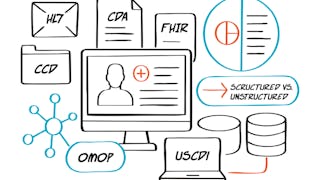This course is the continuation of the Health Informatics for Healthcare Professionals course. If you have not yet taken the introductory course, it is recommend that you complete that course prior to this course. The foundational knowledge from the introduction is carried through in this deeper dive into informatics in healthcare.

Enjoy unlimited growth with a year of Coursera Plus for $199 (regularly $399). Save now.

Healthcare Data Management and Information Systems

Instructor: Dr. John D. Halamka, M.D., M.S.
2,972 already enrolled
Included with
(17 reviews)
Recommended experience
What you'll learn
Identify the impact of data analytics AI and ML on healthcare outcomes
Identify current issues related to digital security and privacy
Evaluate healthcare spending to determine return on investment
Identify emerging trends and developments in the field of healthcare informatics
Skills you'll gain
- Data Management
- Emerging Technologies
- Digital Transformation
- Health Care Administration
- Cybersecurity
- Platform As A Service (PaaS)
- Health Insurance Portability And Accountability Act (HIPAA) Compliance
- Health Informatics
- Data Security
- Technology Strategies
- Healthcare Industry Knowledge
- Innovation
- Health Information Management
- Information Privacy
- Health Care Procedure and Regulation
Details to know

Add to your LinkedIn profile
See how employees at top companies are mastering in-demand skills

There are 4 modules in this course
In this module, the focus will be on the importance of privacy and security in healthcare. Privacy is about respecting patient decisions regarding data usage, access, and purpose, while security is about enforcing those privacy constraints through technology. The module includes case studies and examples of the risks associated with privacy breaches and the importance of enforcing regulations like HIPPA and European regulations to protect patient data while still allowing for innovation in healthcare technology. By the end of this module you will take away lessons in mitigating and preventing security risks to an organization.
What's included
8 videos8 readings1 quiz6 assignments1 peer review1 discussion prompt
While learning about various health information systems is important for allowing organizations to improve their clinical outcomes and workflow efficiencies, budgeting is a crucial component to the implementation of new technologies. This module will explore how budgeting occurs for health information systems and how strategic financial planning impacts how organization’s reach goals. You will compare operating and capital expenses and analyze the processes and practices for successful planning of both types of budgets. Finally, you will reflect on how to form successful budgeting teams.
What's included
6 videos2 readings1 quiz5 assignments1 discussion prompt
In the healthcare industry, emerging technologies can be used to greatly improve clinical outcomes and operational efficiencies. However, with these new technologies come may potential risks and challenges that need to be understood and explored prior to implementation. In this module, we will explore the emerging frontier of healthcare technology with emphasis on wearables and home-based care. As we are learning throughout this course, collecting data from many different sources provides a more holistic approach to healthcare. This module will cover more data types such as patient-sourced data and exposome data and how these can help healthcare organizations provide better patient care.
What's included
7 videos5 readings1 quiz6 assignments1 discussion prompt
Healthcare Information Technology is facing a digital transformation as we look toward the future of information systems. Organizations are pivoting away from a pipeline approach to a platform approach when implementing organizational strategy and incorporating new innovations. This module will explore these approaches and highlight this shift towards platform thinking through examples from the Mayo Clinic Platform. Finally, this module will conclude discussing the global transformation that is being seen across healthcare systems worldwide and what these changes mean for healthcare as we know it.
What's included
7 videos6 readings6 assignments1 peer review
Instructor

Offered by
Explore more from Health Informatics

Illinois Tech
 Status: Preview
Status: Preview Status: Preview
Status: PreviewNortheastern University
 Status: Free Trial
Status: Free TrialJohns Hopkins University
Why people choose Coursera for their career




Frequently asked questions
To access the course materials, assignments and to earn a Certificate, you will need to purchase the Certificate experience when you enroll in a course. You can try a Free Trial instead, or apply for Financial Aid. The course may offer 'Full Course, No Certificate' instead. This option lets you see all course materials, submit required assessments, and get a final grade. This also means that you will not be able to purchase a Certificate experience.
When you purchase a Certificate you get access to all course materials, including graded assignments. Upon completing the course, your electronic Certificate will be added to your Accomplishments page - from there, you can print your Certificate or add it to your LinkedIn profile.
Yes. In select learning programs, you can apply for financial aid or a scholarship if you can’t afford the enrollment fee. If fin aid or scholarship is available for your learning program selection, you’ll find a link to apply on the description page.
More questions
Financial aid available,
¹ Some assignments in this course are AI-graded. For these assignments, your data will be used in accordance with Coursera's Privacy Notice.





